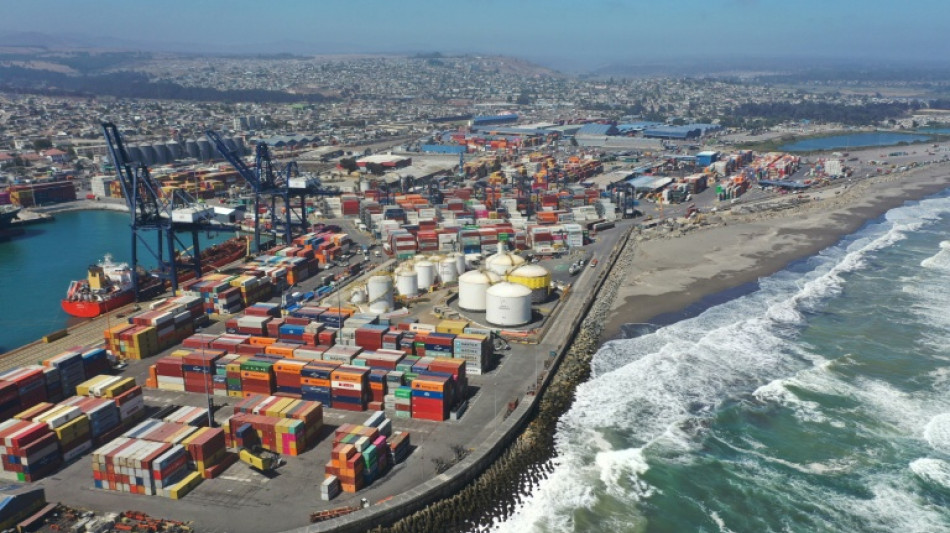
-
 German broadcaster recalls correspondent over AI-generated images
German broadcaster recalls correspondent over AI-generated images
-
US Supreme Court strikes down swath of Trump global tariffs

-
 England's Itoje says managing 'emotional turmoil' key to 100 cap landmark
England's Itoje says managing 'emotional turmoil' key to 100 cap landmark
-
Trump says weighing strike on Iran as Tehran says draft deal coming soon

-
 Tudor is '100 percent' certain of saving Spurs from relegation
Tudor is '100 percent' certain of saving Spurs from relegation
-
Azam dropped for scoring too slowly, says Pakistan coach Hesson

-
 Stocks volatile after soft US growth data, court ruling against tariffs
Stocks volatile after soft US growth data, court ruling against tariffs
-
Italy bring back Capuozzo for France Six Nations trip

-
 From Malinin's collapse to Liu's triumph: Top Olympic figure skating moments
From Malinin's collapse to Liu's triumph: Top Olympic figure skating moments
-
Arteta urges Arsenal to 'write own destiny' after title wobble

-
 Ukraine Paralympics team to boycott opening ceremony over Russian flag decision
Ukraine Paralympics team to boycott opening ceremony over Russian flag decision
-
Wales captain Lake wants fans to bring 'noise' against Scotland

-
 Skier Vonn's Italian hospital a hotbed of men, sister says
Skier Vonn's Italian hospital a hotbed of men, sister says
-
India target S.Africa top order, Abhishek to come good: bowling coach

-
 Carrick praises Man Utd 'diversity' after Ratcliffe's immigrant rant
Carrick praises Man Utd 'diversity' after Ratcliffe's immigrant rant
-
I never thought it would be hit, says 'Scream' creator 30 years later

-
 AI summit statement delayed to 'maximise' signatories: India
AI summit statement delayed to 'maximise' signatories: India
-
Barcelona's Sagrada Familia basilica hits peak height

-
 Milan sprints to second straight UAE stage win as Tiberi keeps lead
Milan sprints to second straight UAE stage win as Tiberi keeps lead
-
US GDP growth misses expectations as Trump blames shutdown

-
 Benfica investigate video of fans' monkey gestures
Benfica investigate video of fans' monkey gestures
-
French minister pledges tight security at rally for killed activist

-
 Guardiola 'couldn't care less' about Arsenal stumble in title race
Guardiola 'couldn't care less' about Arsenal stumble in title race
-
UK police search property as royals reel from Andrew's arrest

-
 Germany's Merz to visit China next week
Germany's Merz to visit China next week
-
Kompany says Mourinho made 'huge mistake' in Vinicius racism row

-
 X appeals EU's 120-mn-euro fine over digital content violations
X appeals EU's 120-mn-euro fine over digital content violations
-
Galthie recalls hulking locks Flament, Meafou for Italy

-
 Turkey, Saudi sign major solar power deal
Turkey, Saudi sign major solar power deal
-
US Olympic freeskier Hess embraces 'loser' tag after Trump blast

-
 European stocks rebound, oil prices ease after US-Iran volatility
European stocks rebound, oil prices ease after US-Iran volatility
-
'Alpha male' AI world shuts out women: computing prof Hall

-
 New Zealand freestyle skier Ives in hard Olympic crash
New Zealand freestyle skier Ives in hard Olympic crash
-
New Zealand must adapt quickly to Sri Lanka wickets: Chapman

-
 Thai activist's jail term for royal insult extended to 30 years
Thai activist's jail term for royal insult extended to 30 years
-
Families of Duterte's drug war victims eye Hague hearing with hope

-
 India chases 'DeepSeek moment' with homegrown AI
India chases 'DeepSeek moment' with homegrown AI
-
UN touts panel for 'human control' of AI at global summit

-
 Ukraine Paralympics team to boycott Opening Ceremony over Russian flag decision: statement
Ukraine Paralympics team to boycott Opening Ceremony over Russian flag decision: statement
-
UK monarchy reels from Andrew's stunning arrest

-
 Somaliland, where Muslims love Israel
Somaliland, where Muslims love Israel
-
Florida airport to be renamed after US President Donald Trump

-
 Fans flock to Japan zoo to see viral baby monkey Punch
Fans flock to Japan zoo to see viral baby monkey Punch
-
Stocks mixed, oil rises after Trump Iran threat

-
 Outspoken Laos lawmaker's election exit sparks rare dissent
Outspoken Laos lawmaker's election exit sparks rare dissent
-
Kim Jong Un vows to boost living standards as he opens rare congress

-
 Shepherd hat-trick to Samra ton: Five top T20 World Cup performances so far
Shepherd hat-trick to Samra ton: Five top T20 World Cup performances so far
-
Zimbabwe surprise as T20 World Cup Super Eights begin without Australia

-
 Victorious Takaichi promises 'strong and prosperous' Japan
Victorious Takaichi promises 'strong and prosperous' Japan
-
Ex-South Korea leader apologises for martial law crisis


Rising seas test defenses of South American ports
When waves come crashing over the sea wall in Chile's biggest port of San Antonio, dockers run for cover.
The state-run port, which handles 1.7 million containers annually, is frequently lashed by swells several meters high as rising ocean levels linked to climate change cause more frequent storm surges.
Some of the waves dwarf the wall that protects the port from where Chile ships wine and fruit to the world, ripping away 20-ton blocks of concrete defenses.
Since 2020, approximately 270 vessels each year have been either unable to dock at the port or set sail from San Antonio because of the raging seas.
San Antonio's location, in a wide bay with no natural defenses, leaves it particularly vulnerable to storm surges, said Andres Orrego, director of Chile's Portal Portuario shipping news site.
But all along South America's Pacific coast, shipping is being buffeted by rising sea levels.
With the southern hemisphere's approaching winter, when the biggest swells occur, the race is on to keep the tide at bay.
The new Chinese-built megaport at Chancay in Peru, which was inaugurated by President Xi Jinping in November, comes with a massive breakwater almost three kilometers (two miles) long.
On a recent day of calm seas at San Antonio, cranes were busy moving blocks to reinforce the sea wall and top it with curved concave blocks that break the waves' momentum as part of an $11-million climate mitigation upgrade.
Half of the wall has already been reinforced, helping reduce the number of days the port is out of action, from 47 in 2023 to 30 last year.
Over 1,300 kilometers to the north, the port of Antofagasta, which handles most of Chile's copper exports -- Chile is the world's biggest producer of the metal -- also plans to boost its storm defenses to reduce downtime.
- Major investment required -
The biggest port in the South Pacific, Callao port in Peru, is protected by a breakwater nearly 13 meters (43 feet) high.
The two nearby islands of San Lorenzo and El Fronton also act as natural coastal barriers.
And yet the port was forced to close for 10 days at the end of 2024, during storms that brought waves of up to four meters and raised concerns for worker safety.
Storm surges have also caused a slowdown in activity at Manta in Ecuador, a major tuna export hub which was forced to close for several days last year, according to the port's management.
The water swept away two barriers installed on stilts, leading the port operator to declare that "coastal protection works... and adaptation strategies... are now required."
Chilean climatologist Raul Cordero blames the "more intense and frequent storm surges" along the Pacific coast on the increase in ocean temperatures and levels.
"A lot of money will have to be invested in protection against (extreme) waves," he warned.
The port operators that spoke to AFP declined to give estimates for the revenue lost to rising seas.
But shipping companies have to pay between $80,000 and $150,000 for each extra day they remain moored in San Antonio, the port's deputy operations manager told AFP.
Jose Aldunate, who is in charge of boosting San Antonio's storm defenses, said he expects the port's new defenses to be breached by some extreme swells.
But he expressed confidence that, once the upgrade is finished in 2026, the flooding would be "within acceptable levels, so that the port can continue operating without problems."
P.Costa--AMWN

